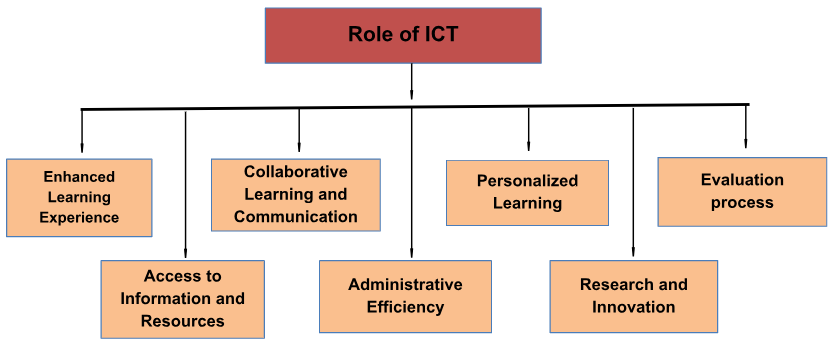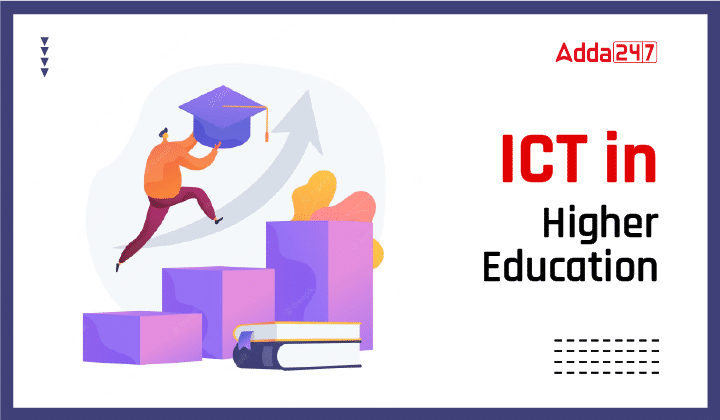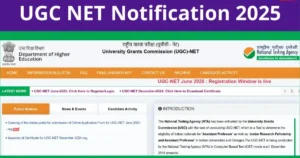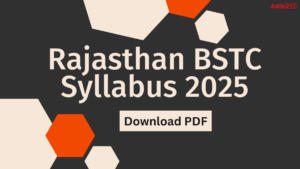Table of Contents
Information and Communication Technology (ICT) has revolutionized higher education, transforming the way students learn, teachers teach, and institutions operate. With the advent of digital technologies, the educational landscape has witnessed a paradigm shift, offering new avenues for engagement, collaboration, and personalized learning.
Role of ICT in Higher Education
Information and Communication Technology (ICT) has transformed various aspects of higher education, revolutionizing teaching, learning, research, and administration. Below, we will explore the key benefits and implications of ICT in higher education and how it has shaped the teaching-learning process, expanded access to knowledge, and streamlined administrative operations.

Enhanced Learning Experience:
- Interactive and engaging learning: ICT tools have significantly enhanced the learning experience in higher education. Learning Management Systems (LMS) and online course platforms have replaced traditional classroom settings, providing students with a flexible and interactive learning environment.
- Flexibility in learning: By leveraging ICT, students can access course materials, participate in discussions, submit assignments, and collaborate with peers irrespective of their geographical location or time constraints.
- Personalized learning: Adaptive learning systems offer customized content and feedback based on individual needs.
Access to Information and Resources:
- Vast digital resources: ICT has revolutionized the accessibility of knowledge and information in higher education. Online databases, digital libraries, e-books, and scholarly journals provide immediate access to a vast array of resources.
- Independent research: Moreover, ICT tools enable seamless navigation, search capabilities, and personalized recommendations, ensuring that learners can efficiently explore and utilize the wealth of digital resources available.
- Efficient information search: ICT tools offer search capabilities, personalized recommendations, and efficient navigation of digital resources.
Collaborative Learning and Communication:
- Global collaboration: ICT facilitates collaboration and communication among students, teachers, and researchers. Online platforms, video conferencing, and virtual classrooms break down the barriers of time and distance, allowing for seamless communication and collaboration.
- Real-time communication: Students can engage in online discussions, share ideas, and work on group projects regardless of their physical location.
- Peer learning and knowledge sharing: Discussion forums and collaborative platforms foster a sense of community and promote collective problem-solving.
Administrative Efficiency:
- Streamlined administrative processes: ICT tools simplify tasks such as registration, grading, and data management, saving time and improving efficiency.
- Paperless operations: Student information systems, online registration, digital grade books, and automated workflows simplify administrative tasks, reducing paperwork and manual efforts.
- Enhanced institutional effectiveness: With streamlined administrative operations, faculty and staff can dedicate more time to teaching, research, and student support, ultimately enhancing the quality of education and overall institutional effectiveness.
Personalized Learning:
- Tailored experiences: ICT enables personalized learning experiences that are tailored to individual student needs, preferences, and learning styles.
- Customized Learning Content: With ICT, students can access learning materials that are specifically aligned with their strengths and weaknesses.
- Flexible Pace and Feedback: ICT allows students to learn at their own pace, providing the flexibility to review concepts or progress faster as needed.
Research and Innovation:
- Global research collaboration: ICT has revolutionized research in higher education. Researchers can collaborate globally, access specialized databases, perform data analysis, and use simulation software to conduct experiments.
- Access to specialized resources: Online databases, high-performance computing, and simulation software support advanced research endeavors.
- Dissemination of research findings: With the help of ICT, researchers can disseminate their findings rapidly through digital platforms, contributing to the advancement of knowledge and promoting interdisciplinary collaborations.
Evaluation process:
- Utilizing ICT Components: The evaluation process in higher education utilizes various components of ICT. These components encompass multiple aspects, including measuring student competency, and physical and mental well-being.
- Online Selection Tests: ICT is employed for online selection tests in various professional job fields.
Challenges of ICT in Higher Education
Information and Communication Technology has emerged as a powerful force in higher education, transforming the way education is delivered, accessed, and experienced. Although it has its own limitations in providing enhanced learning features, ICT has become an integral part of the higher education landscape. Although it has benefitted and simplified the process of learning and teaching, it suffers from some challenges which are as follows:

Digital Divide
- Unequal access: Limited access to technology and the internet can create a digital divide, hindering some students’ participation in digital learning opportunities.
- Socioeconomic disparities: Students from economically disadvantaged backgrounds may face challenges in accessing ICT resources and keeping up with technological advancements.
Technological Dependency
- Vulnerability to disruptions: Relying heavily on ICT can leave students and institutions vulnerable in the event of technological failures, disruptions, or lack of technical support.
- Overreliance on technology: Excessive dependence on ICT may hinder the development of critical thinking skills and the ability to learn in non-digital environments.
Online Disengagement
- Lack of face-to-face interactions: Online learning environments may lead to feelings of isolation and decreased student engagement.
- Motivation and active participation: Maintaining student motivation and active participation is crucial for successful online learning.
Security and Privacy Risks
- Data protection: Handling personal data requires strict security measures to protect sensitive information from data breaches and cyber threats.
- Privacy concerns: The use of ICT in higher education involves collecting and managing personal data, requiring compliance with privacy regulations and ethical considerations.




 UGC NET Notification 2025 Out, Exam Date...
UGC NET Notification 2025 Out, Exam Date...
 Rajasthan BSTC Syllabus 2025, राज�...
Rajasthan BSTC Syllabus 2025, राज�...
 Latest Job Alert for Teaching and UGC As...
Latest Job Alert for Teaching and UGC As...














